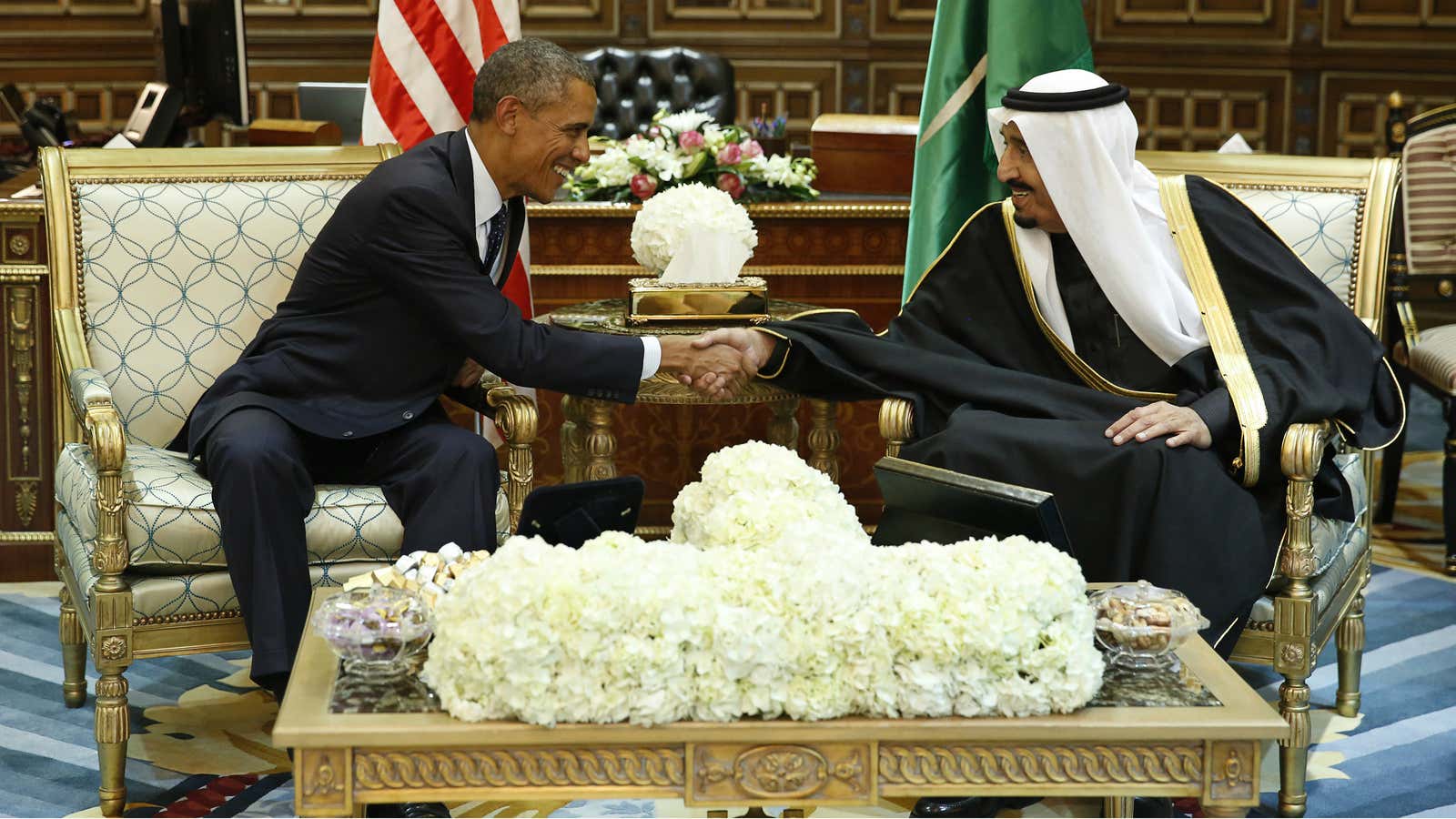The last 11 months have been an unlikely journey for oil, with its widely unanticipated price dive, Saudi Arabia’s uncharacteristic refusal to stem the bloodletting, and financial havoc for petro-powers and energy companies.
But as improbable as the journey has been, it is not over. A number of leading analysts say that OPEC has been rendered largely impotent in this new age. The US, they say, is oil’s new czar.
It’s not just a matter of bragging rights: oil remains the driving force behind business activity around the world, and its availability and price can make or break national economies. By sitting athwart a third of the world’s oil supply, and being willing to manipulate the supply to influence price, OPEC has achieved enormous global influence. If OPEC—and especially Saudi Arabia, its most important member—has truly lost its pricing leverage, its members will become more like Russia: still vital as a source of a lot of oil, but absent the credibility that comes with dictating prices. It will be a tectonic shift in modern geopolitical power back toward the US and its allies.
Citi’s Edward Morse forecast the price plunge, though he got the timing wrong. He told Quartz in an email that no OPEC member can maintain pricing influence for long, since the “US will come roaring back as prices rise.”
What Morse is highlighting is a unique characteristic of shale oil—extracting it is in some ways more like mining than drilling. This is because the oil is blasted out of dense shale, and then pumped above. The process is much faster and cheaper than the typical oil well, which can take more than a year to reach production. Over the past 20 weeks, drillers, responding to the price plunge, have idled 56% of the 1,609 rigs that were working US fields as of October, leveling out the surge in shale production.
But before idling their rigs, the drillers have also done about a quarter of the drilling work on dozens of new wells, and left them uncompleted; should prices rise far enough, and stay there—say above $60 a barrel—Morse and other analysts think the drillers may complete some or many of these wells in order to reignite their cash flow, and again flood the market with oil. Oil prices will then again plunge—and it will be US producers driving prices.
But doesn’t that ignore that Saudi started all this upheaval?
In a piece worth reading, Bloomberg’s Peter Waldman documents Saudi Arabia’s actions last year when the shale oil surge triggered a global glut. Rather than invoking OPEC’s usual tactic of cutting production, Saudi elected to cut its prices, maintain market share, and add to the flood of oil by opening its own taps to record production levels of 10.3 million barrels a day. When OPEC members Iran and Venezuela pushed for cuts, Saudi refused: it would keep the taps open and prices down until higher-cost producers, such as shale drillers, were forced out.
Mark C. Lewis, an analyst at Kepler Cheuvreux in Paris, argues that chronology shows that Saudi is still calling the shots. By the end of the year, he said, Saudi will prevail over shale drillers. “The fact is that the shale boom needs both high prices and low interest rates to sustain it. Otherwise it will turn to bust,” Lewis told Quartz. “And that bust is already beginning to happen, in my view.”
The debate over the longevity of shale will not be decided now, but over the coming months and years on the US oil patch itself. Regardless of how it ends, the war of words is likely to persist, driven by the very implausibility of the oil world’s convulsion—so unexpected is the state of affairs that even the soberest analysts seem prepared to consider almost any claim as part of a possible new orthodoxy.
What seems indisputably true is this: OPEC and Russia—the industry establishment—must accept the US as a new, fixed player in global oil. And US producers must understand that OPEC, and in particular Saudi Arabia, is not going to make the petro-club a comfortable place for them.
The most balanced appraisal of the current landscape is that, despite the boasts of various quarters in the US, the Saudis—having produced the current state of affairs—remain, at least for now, the mightiest power in oil. If anyone controls where we go from here, it is Saudi Arabia—who with a single order can summon up or shut off some 2 million barrels of oil almost instantaneously.
For everyone, roiling financial and especially civil turmoil lies ahead—in the Middle East, North Africa, Latin America and possibly in and around the former Soviet Union, all a consequence of the oil glut and the age’s new politics.
“The US is going to be a major player, but the Saudis re-established their influence by engineering this price collapse,” Phil Flynn, an oil trader with the Price Group, told Quartz. “The Saudis want to stay the kingpin of the global oil market.”
